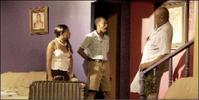By Marcia Rowe, Freelance Writer
Thelma (left) and Delcita reason out matters in 'Di Driva'.- Colin Hamilton/Freelance Photographer
The members of the audience were beside themselves with uncontrollable laughter. At times their response was akin to that in a dance, middle and index fingers pointing upwards in a 'gun salute', as they jumped out of their seats.
They were reacting to the folly and foibles of the six characters on the stage.
Such was the reception to Paul Beale's Di Driva on Wednesday at the Green Gables Outdoor Theatre (the indoor theatre was not able to hold the large audience), Cargill Avenue, St Andrew.
humorous language
Di Driva is a typical roots play: a light comedy with humorous language, though bawdy. In fact, it may be described as a free zone for insults as the characters - all three males and one of the females - traded insult after insult. Husband insults wife; father insults daughter and son-in-law; boyfriend insults girlfriend, who replies in kind.
The play tells the story of a politician, Ronnie Jones, and his wife Thelma, a former beauty queen. Despite several attempts at reproduction they have remained childless. Their childlessness becomes more of an issue than the election results.
But to their rescue is the eccentric Doctor Susan First, who recommends and supervises surrogacy. Contributing to the humour more than the plot is James, Thelma's father, who is en route to Cuba for eye surgery and stays at the Jones' house. Then there is a rather entertaining couple, Delcita Coldwater and Driva, from somewhere in the country. They are both unemployed when the play begins; Driva is a (what else?) driver, while Delcita has no skill.
'country' girl
At the outset Delcita is presented as a stereotypical 'country' girl, very stupid, but while her naivety continues throughout the play she also demonstrates that she is shrewd in business. Driva, who seems to be the god of insults, is also projected as a shrewd character.
Through the Joneses, Beale directs attention to a not-so-talked-about martial problem, a couple's inability to produce children. Often, as presented in the play, where Ronnie blames Thelma, the problem is believed to be the woman's fault. While using a great portion of the play to highlight the discord created by the Joneses' childlessness, Beale offers a solution - surrogacy. But, he asks, how practical would this be in the present Jamaican economical climate?
Beale's ability to use current political and social events to generate laughter is admirable; likewise his use of dramatic irony. This proves to be one of the best techniques to get the audience involved in the drama, especially when Driva and Delcita are reunited in Kingston.
On the other hand the characters do not offer much emotional growth, despite a few going through physical changes. Delcita and James undergo physical changes - Delcita through pregnancy and James with his eyesight being restored. But their experiences seem to have little effect on them.
Definitively, the strength of the cast members is their ability to concentrate. Surely, it must be very disconcerting to have the audience laughing for prolonged periods throughout the performance. But they persevered.
professionalism
Displaying this high level of professionalism were Keith Ramsey as Driva, Andrea Wright (Delcita), Donald Thompson (Ronnie Jones), Vanashia Rowe (Thelma Jones), Trudy Campbell (Dr Susan First) and Maxwell Grant (James). The entire cast gave creditable performances, showing great understanding of their roles. However, they should remember that microphones amplify sounds and should avoid shouting when there is no need to do so.
The driver of this team of actors was Garfield Reid, who reinforced the comedy through his blocking, especially when the blind James constantly speaks to furniture and open space. Entrances and exits were good, but to have Doctor First and Driva entering the Joneses' house without knocking seems unreal - even for a comedy.
action
Another flaw (and this rests solely with the pen of the playwright) is the creation of situations and not completing them. For example, Ronnie Jones has someone at the airport stop a plane before it takes off, but he does not follow through with the action, which is to take his father-in-law to the airport. Instead, he goes upstairs to his wife and that is the end of it.
Di Driva is a two-act play, the first set in Kingston and somewhere in the country, while the second takes place in Kingston. The set, designed by Beale, reinforces this setting.
Although some people will find Di Driva entertaining, parents must be aware that the subject matter and language of the play are not for children. As such, it was alarming to see so many children at Wednesday's performance.

Delcita (left) and Driva make a move on Mr. Jones' home in 'Di Driva'.

